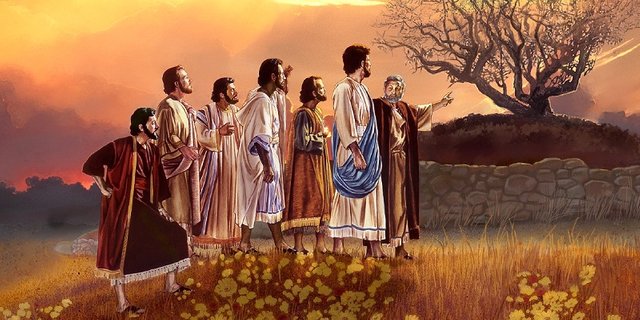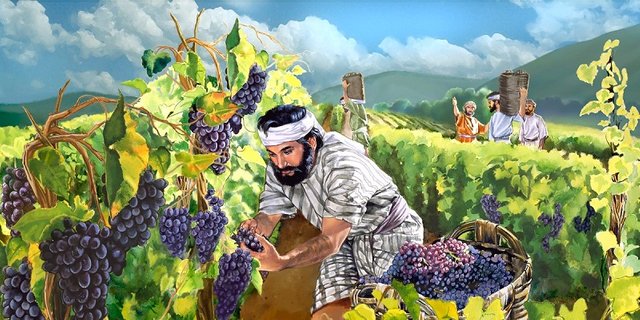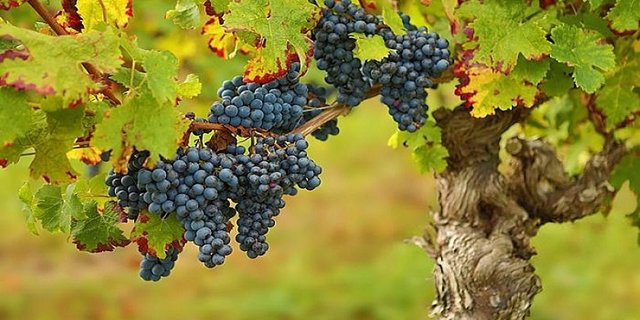Production is the priority in our lives.
Greetings friends of steemit today I write about the parable of the fig tree.
One of the most interesting parables of Jesus Christ has as protagonist an infertile fig tree, and begins thus: "A man had a fig tree planted in his vineyard, and came to look for fruit in it, and did not find it. And he said to the vinedresser: Behold, three years have I come to seek fruit on this fig tree, and I find it not; cut it off; Why does it also disable the earth? He then, responding, said: Lord, leave it still this year, until I dig around it, and fertilize it. And if it bears fruit, good; and if not, you will cut it off later"(Luke 13: 6-9).
Fruit trees require a lot of care and dedication to produce delicious fruits year after year. It is gratifying to see how a tree bends under the weight of apples, pears, oranges or grapes. In addition, going out to the garden and collecting the fruits that one has seen grow and mature is an immensely satisfying and instructive experience.

source
It is instructive because we can observe the whole process of fruit development in the tree. First the flower appears and then the first buds of the fruit appear, that over the course of the months it begins to grow and develop. When we follow this process closely, we learn more than when we go to the supermarket and buy the fruit offered on the shelves. The fruit does not appear spontaneously in stores or grows in the delivery truck, but is the result of a laborious process of cultivation and care.
It is very pleasant to be part of the process of fruit growth, since our efforts are combined with nature to achieve a good harvest.
The value of the tree depends on the amount of mature fruits it produces, and this is precisely what justifies the valuable space of soil it occupies. Satisfaction is so important in this process that when the tree does not bear fruit one stands in front of him trying to understand what happened. But before delving into the parable of our history, we must understand what Jesus was saying before delivering it.
A message about repentance
At the beginning of Luke 13 we see that Christ is being informed of "the Galileans whose blood Pilate had mixed with their sacrifices" (v. 1). The Roman governor of the province had committed a terrible act against the Galileans, but it is not clear to us whether it was the result of any provocation. Was that an act of reprisal for an attack on the Romans, or just a whim of the governor to flaunt his cruelty and keep the citizens so frightened? We do not know; However, Christ took advantage of this incident to teach a profound lesson and, as was his custom, he used a parable to emphasize what he wanted them to learn.
In Luke 13: 2 we read what Jesus replied: "Do you think that these Galileans, because they suffered such things, were more sinful than all the Galileans? I say: No; before if you do not repent, you will all perish equally "(emphasis ours in this whole article).
Solomon wrote in Ecclesiastes 9:11 that "time and occasion happen to all." We do not always have control over the events that affect us as a consequence of the hurried pace of life and daily events.
Jesus wanted to show that these poor people were like all human beings, with weaknesses and strengths, and that they were suddenly confronted with an event that upset their lives.
In the following verses, Jesus referred to another well-known event that had recently taken place: the collapse of a tower over a group of people who happened to pass by: "Or those eighteen on which the tower fell in Siloam, and He killed them, do you think they were more guilty than all the men who live in Jerusalem? I say: No; But if you do not repent, you will all likewise perish "(Luke 13: 4-5).
Two stories of everyday life; two calls to repentance, to change the course of our lives. With the phrase "you will perish likewise", Jesus was warning them that they could meet the same fate as those who had unexpectedly been involved in circumstances beyond their control, and whose lives had vanished in the blink of an eye.
This is a subject that should fill us with humility. We do not like to think about it and, to be honest, most of us are reluctant to believe that life is like that, but it is. Life offers no guarantees of any kind.
Every day we hear news about accidents, natural catastrophes and attacks charged by the vimany innocent people. People lose property, land and rights because of the actions of third parties who never think about what is good, bad or just. The world works this way most of the time, and we must understand its implications.
Jesus was being frank - realistically frank - with the people who were listening to him. Things happen in this world that we have no control over, and sometimes decent, well-meaning people-people like you and me-are affected. He wants us to understand this very well so that we can do everything in our power, considering that "time and occasion" can happen at the least expected time.
Change and production
The word repentance is not very popular in our times, and we may have to consult a dictionary to understand what it means. Its core meaning is to change; In other words, stop doing something that is not productive or that is leading us down the wrong path. It means to stop going down a certain path in life, a path that can be self-destructive, and change direction to follow a productive path.

source
Biblically, and according to what Christ expressed here, it means to stop breaking the law of God and begin to obey it. Christ said it with the same intention he used when he first preached the gospel of the Kingdom of God, as indicated in Mark 1:15: "The time has been fulfilled, and the kingdom of God has come near; repent, and believe in the gospel. " This statement of yours means that a new system of life is at hand, and that we must develop a way of thinking that fits into it.It means producing ** "fruits worthy of repentance" ** (Matthew 3: 8).
This brings us back to the parable.
A fig tree that does not bear fruit in a garden is practically unusable - unless you are like Nathanael and want to use it. only to give him shade (John 1:48). And if it has not paid off for three years in a row, the owner may be forced to take some measures. It is not that the tree is dry or can no longer bear fruit, but that it has lacked adequate care and does not do more than mark the seasons of the year. The same thing happens with many people: they are alive and breathing, but they do not produce any fruit.
You can find the answers to these questions, and they can have a positive impact on your life.
God wants you to find such answers. God lengthens the time to give us an opportunity to change.
The vineyard owner's response to the problem of the sterile fig tree was emphatic: "cut it off; Why does it also render the earth useless? "(Luke 13: 7). Such a solution was radical and definitive. This fact shows us a truth about God: the Eternal is full of mercy and compassion; He is patient and loving, but he is also a God of justice, and Christ is warning us that there will be a final judgment for all who have lived, especially if they have received their opportunity, warnings, and the benefit of the doubt. When we meditate on the previous admonition, "unless they repent," we learn that there is a way to avoid being "cut off" and considered worthless. Do not be discouraged! The rest of the parable teaches us that there is a way out. The caretaker of the fig tree says to its owner: "Lord, leave it still this year, until I dig around it, and fertilize it. And if it bears fruit, good; and if not, you will cut it off later "(Luke 13: 8-9).
The caregiver asks for one more year to work with the tree, to make it useful and productive. There is hope and confidence that the wise and diligent attention of the caregiver will achieve a new outbreak of productivity, so that they can reap fruit in the next season. This is the key to everything.
Here we see that God has the roles of caretaker and owner of the vineyard. This shows us that we belong to him and that he gives us space to grow spiritually, but also expects us to bear "fruit" - the product of a life of good and just works.
Galatians 5: 22-23 defines the type of fruit that God wants see in our lives: "But the fruit of the Spirit is love, joy, peace, patience, kindness, goodness, faith, meekness, temperance; against such things there is no law. " The apostle Paul explains in these vThe qualities are the fruit of the Spirit of God.

source
The Eternal can produce these fruits in our lives when we repent and believe in the gospel, submitting to it and letting His Holy Spirit guide our life. The parable of the fig tree tries to teach us a fundamental truth: with the help of God, repentance It is necessary and possible. He is patient and gives us time to change and bear fruit. However, none of us knows how much time he has, which is why it is better to start now.
When God always judges he does it with justice, and only he understands the depth of our life. He is conscious of taking care of his "vineyard" and the fact that he knows under what conditions each one of his trees is is comforting. His desire is that no one perish (2 Peter 3: 9), but that all produce abundant fruit and inherit eternal life LIFE
Fruitfulness is the watch word, we are not just in life to be witness but to grow, learn, develop spiritually and be fruitful, I always say that our lives are meant to be like flowers shinning for others to see and admire, we have a role to play.
this is friend, we are the light of this world.
Hello! I find your post valuable for the wafrica community! Thanks for the great post! We encourage and support quality contents and projects from the West African region.
Do you have a suggestion, concern or want to appear as a guest author on WAfrica, join our discord server and discuss with a member of our curation team.
Don't forget to join us every Sunday by 20:30GMT for our Sunday WAFRO party on our discord channel. Thank you.
You got a 13.89% upvote from @brupvoter courtesy of @josevina!
!cheetah ban
User refused to stop plagiarism despite being commented by Steemcleaners before.